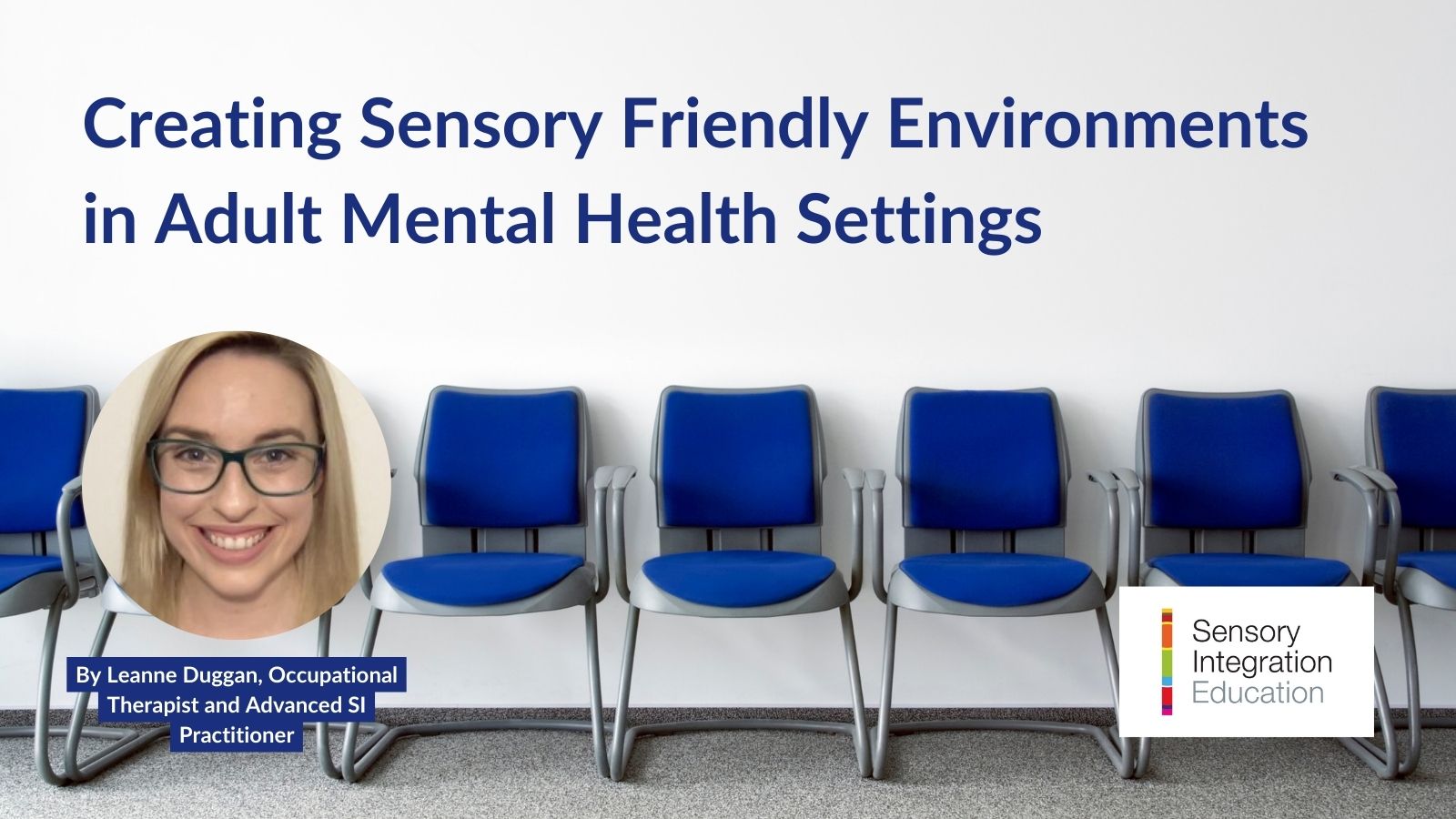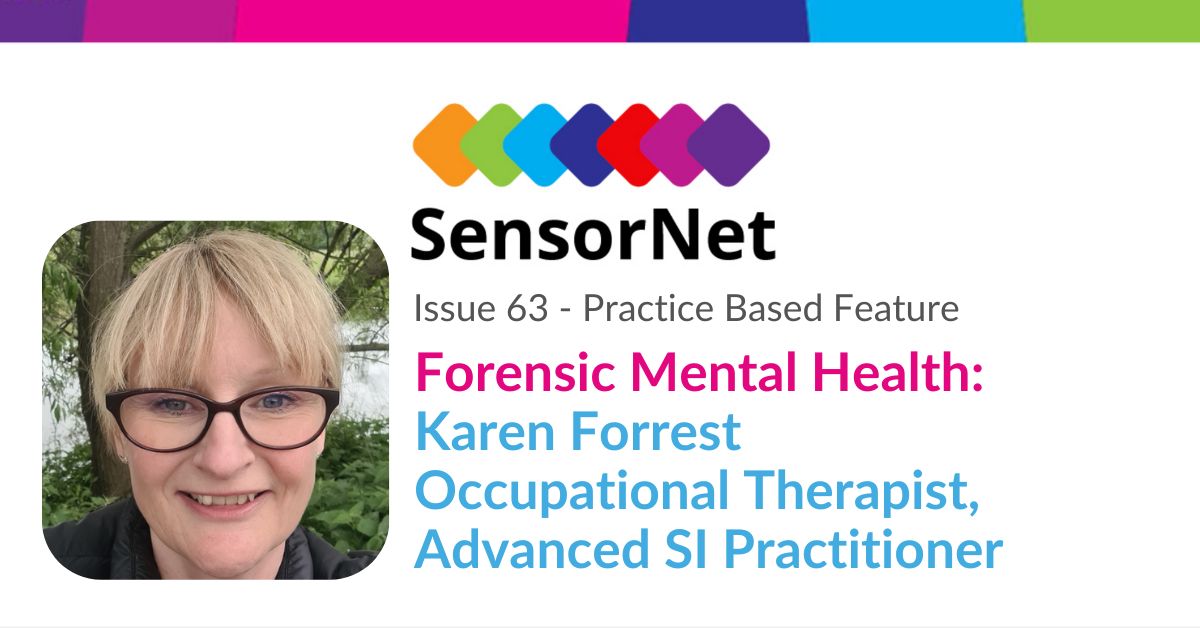EmphaSIze March 2025: Mental Health and Sensory Needs
By Sensory Integration Education, 28th February 2025

Welcome to the March issue of EmphaSIze where this month we're focusing on Mental Health and Sensory Needs!
Everyday activities can often be challenging or unpleasant for individuals with sensory processing differences and this can impact their mental health. Many studies show clear links between mental health and sensory processing sensitivities.
In this month’s newsletter, you'll find useful information, research, articles, books, and product ideas that look at supporting your clients’ mental health and sensory needs.
We also have some exciting news about a new platform we’ve launched called Sense in Work which is dedicated to helping businesses, healthcare settings and community spaces become more sensory inclusive. Read the article below to find out more!
News & Features
Introducing Sense in Works – A New Resource for Promoting Sensory Inclusion
At Sensory Integration Education, we’ve spent decades equipping therapists with the knowledge and skills to support individuals with sensory processing differences. Now we’re taking that expertise beyond the therapy room and into workplaces, public spaces and organisations with Sense in Work — a dedicated new platform designed to help businesses, healthcare settings and community spaces become more sensory inclusive!
As a therapist, you’re in a unique position to champion sensory inclusion. You may already be supporting businesses, schools or healthcare settings in understanding how sensory needs impact daily life. Now there are two distinct resources to share with these organisations:
- If you work with schools, direct them to the Sensory Inclusive Schools website, which provides lots of free resources or consider using the Sensory Inclusive Schools professionals package yourself.
- If you work with businesses, healthcare settings or community spaces, Sense in Work provides structured training to help these organisations create more sensory inclusive environments.
Find out more about Sense in Work here.
Creating Sensory-Friendly Environments in Adult Mental Health Settings
Adult mental health services are provided across a range of settings: home environments, clinics, community settings, acute mental health settings, nursing homes and residential centres. This can create challenges for SI Practitioners when working with clients in a way that meets their sensory processing needs.
In her blog published last year, Leanne Duggan, OT and Advanced SI Practitioner working in adult mental health, shares her thoughts and suggestions how to create a sensory friendly environment in the adult mental health settings.
SensorNet Practice-Based Feature: Forensic Mental Health
Published in issue 63 of SensorNet in September 2024, this article features an interview with Karen Forrest, a UK-based Occupational Therapist, Advanced Sensory Integration (SI) practitioner and certified EcoSensory therapy practitioner. Karen has a particular clinical interest in attachment and developmental trauma.
In this interview, Karen looks at what a sensory-informed practice approach looks like in a forensic mental health setting, offers advice on conducting SI assessments and shares her practical top tips for implementing SI in this type of setting.
Exploring the Relationship Between Sensory Integration and Mental Wellbeing
Differences in how we process sensory information are an expected part of human diversity. However, these differences can sometimes make it challenging for individuals to participate in certain activities or do certain things. In our latest blog, we take a look at the relationship between sensory integration and mental wellbeing and explore how sensory processing differences can impact mental wellbeing in everyday situations.
New Course: How to Make Your Space Sensory Inclusive in 8 Steps
For many, everyday environments can be overwhelming. Harsh lighting, unpredictable noises and crowded spaces can make it difficult for individuals with sensory processing differences to fully engage.
Our new course ‘How to Make Your Space Sensory Inclusive in 8 Steps’ is a practical guide to transforming workplaces, GP surgeries, healthcare facilities, shops, offices, libraries and community spaces into inclusive environments for all.
If you work in any of these settings, please help spread the word by sharing the course details with your colleagues!
Also see:
Supporting neurodivergent children to walk, wheel and cycle to school in Scotland
Westfield London launches new sensory room to champion inclusivity
Travel agency opens sensory room for families with neurodivergent children
£14,000 sensory room to transform care for children with additional needs
Bristol City open a matchday sensory room at Ashton Gate to support fans with sensory needs
Resources

Take a look at our books and products recommendations for this month:
An Occupational Therapist’s Guide to Sensory Integration and Adult Mental Health: Available to pre-order now, this book is an evidence-based reference manual for occupational therapists on implementing sensory integration in mental health settings. Written by Becky Matson, Advanced SI Practitioner and Lecturer in OT at University of Liverpool, in her words “As passionate Sensory Integration Practitioners, we hope this book will be the resource we wish we had to support our learning both during and after our training. It aims to be an evidence-based resource to help students and SI Practitioners to develop their skills, knowledge and SI practice within adult mental health services.”
Neurodiversity-Affirming Therapy: What Every Mental Health Provider Needs to Know: Available from 15 April, this book offers practical strategies, evidence- based techniques, and a deep understanding of neurodiversity for therapists seeking to provide inclusive and affirming care to neurodivergent clients.
Sensory Beanbag: These beanbags are made from a selection of different textured and coloured fabrics and are ideal for children who like to touch and explore different surfaces.
Sensory Play Tunnel: Lightweight and versatile, this sensory play tunnel is designed for children with sensory dysregulation, providing a calming and relaxing experience. Perfect for sitting, hiding, crawling, or jumping, this sensory tunnel doubles as a large bean bag chair, making it a versatile sensory toy. The outer layer is made of 100% waterproof material, making it easy to maintain and clean.
SI Research Digest

Below are links to the most popular sensory integration and sensory processing research papers and findings published on our social channels last month:
The Relationship Between the Vestibular System and the Circadian Timing System: A Review
This new study investigated the relationship between the vestibular system and the circadian timing system. The researchers found that differences in vestibular sensory processing could impact an individual's circadian rhythm.
Mental Health in Children With and Without ADHD: The Role of Physical Activity and Parental Nativity
This new study investigated the impact of physical activity on children’s mental health in children with ADHD - The researchers found that children and young people with ADHD were much more likely to experience difficulties with mental health, especially anxiety and depression. Further they found that engaging in physical activity was associated with 41–59% lower odds of anxiety/depression in the general children population, and for those with ADHD 39-50% lower.
Can You Help? Call For Research Participants!
We have several research projects listed where researchers are actively looking for participants, including 'Experiences of Gravitational Insecurity' and 'How healthcare professionals with postgraduate certification in Sensory Integration (SI) perceive the influence of EcoSensory Therapy In-Leaf Practicum training on their clinical reasoning'.
👉 More details can be found here. Please contact the research lead directly if you would like to take part or require further information.
Upcoming Courses and Webinars
We have a number of live webinars that take place throughout the year covering a broad range of SI-related topics. Below is a snapshot of webinars happening over the next few months or click here to view a summary of all the upcoming live events.
All these webinars are available to you by signing up to our Lifelong Learning Programme or can be purchased as individual courses:
- Clinical Reasoning for Postural Control Challenges in SI – 12 March 2025
- Gestalt Language Processing and Sensory Integration - 21 March 2025
- An Introduction to Using the Sensory Processing Measure 2 (SPM-2) and Quick Tips in Clinical Practice – 31 March 2025 (FREE)
- An Introduction to Using the Adult/Adolescent Sensory History (ASH) in Clinical Practice – 7 April 2025
- Sensory Spotlight Talk: Inclusive Design with Sensory Intelligence® - 8 April 2025
- Sensory Spotlight Talk: Understanding Motor Disinhibition in Autism – 8 May 2025
Discounts & Special Offers
March Early Bird Offer! Enrol now on one of our SIE Postgraduate courses and save up to £400 on course fees. Offer closes at midnight on 31 March 2025. Visit our Early Bird Booking page to secure your place.
Please quote DISCOUNT CODE SIE20 for 10% discount on Southpaw orders up to £100. Orders must be placed by phone on +44 (0) 115 718 0020.
Would you like to receive EmphaSIze: The Sensory Integration Newsletter in your inbox? JOIN SIE FREE TODAY
Best wishes,
Sensory Integration Education
NB: Sensory Integration Education is not responsible for the content on external websites. Sharing a resource does not imply endorsement by Sensory Integration Education.









